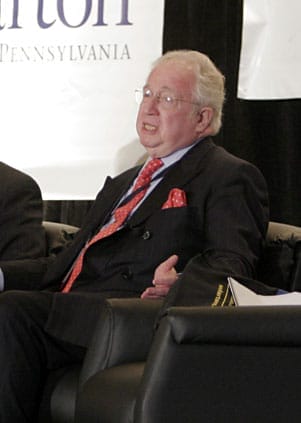 A founding partner of Wachtell, Lipton, Rosen & Katz, Martin Lipton was dubbed one of the “100 Most Influential Lawyers in America” by the National Law Journal. Most famously, Lipton invented the “poison pill,” a takeover defense used by publicly- traded companies to discourage unsolicited acquisitions. His tenacious tactics established him as a household name—if your household is made up of corporate lawyers and directors.
A founding partner of Wachtell, Lipton, Rosen & Katz, Martin Lipton was dubbed one of the “100 Most Influential Lawyers in America” by the National Law Journal. Most famously, Lipton invented the “poison pill,” a takeover defense used by publicly- traded companies to discourage unsolicited acquisitions. His tenacious tactics established him as a household name—if your household is made up of corporate lawyers and directors.
Lipton developed the idea for the poison pill defense during two 1982 hostile takeover battles in Texas. In one, General American Oil was defending itself against a bid by corporate raider T. Boone Pickens. Lipton urged the board to dilute Pickens’ stock purchases by the flooding the market with new shares. They wouldn’t, and the company was sold to a last minute bidder. Lipton then employed another version in the defense of El Paso Company. Using the threat of the “poison pill” (a term not coined until the next year), El Paso negotiated its sale to the hostile suitor from a position of strength. While still controversial, the tactic was ruled legal in 1985.
“As a matter of lawyering, it’s absolutely brilliant,” Stanford University Law Professor Ronald Gilson told Legal Affairs. He said he considers the poison pill to be the most significant piece of corporate legal artistry in the 20th century.
More recently, Lipton has defended generous executive compensations. While speaking at the Reuters Investment Banking Summit in New York he asserted, “Most of the high executive compensation has stemmed from the equity incentive plans and there’s no way in which they could have created that compensation unless the company prospered and the equity appreciated.” Lipton and his firm have won some massive and controversial settlements. In 2007 they represented the Board of Directors of Home Depot Inc. that gave its departing boss a $210 million payout.
The New York Times, when highlighting the accomplishments of Lipton, maintains, “While shareholder gadflies have criticized Mr. Lipton for being an apologist for corporate management, that assertion misses the point — that Mr. Lipton’s fiduciary responsibility is to best represent and advocate in support of his client’s interests.” And on that notion, Mr. Lipton leaves little room for objection.

























